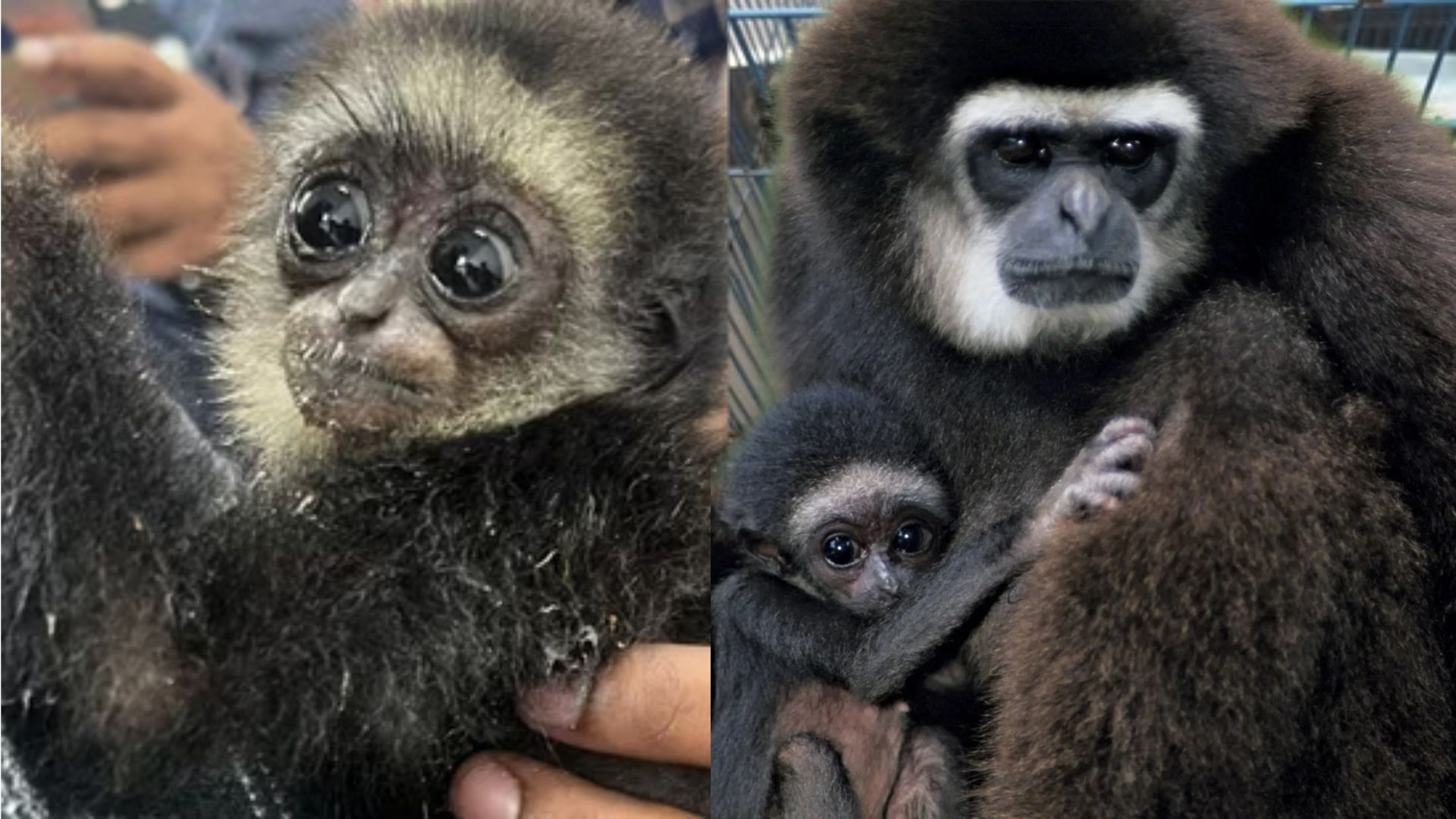Home / bengaluru / Caught Red-Handed: Bengaluru Airport Busts Exotic Wildlife Smuggling Racket
Caught Red-Handed: Bengaluru Airport Busts Exotic Wildlife Smuggling Racket
By: My India Times
3 minutes read 29Updated At: 2024-12-20

The recent arrest of two individuals at Bengaluru's Kempegowda International Airport has unveiled a chilling episode of illegal wildlife smuggling. Customs officials successfully intervened to rescue four rare agile gibbons found concealed within a trolley bag, underscoring the cruel practices that contribute to the multi-billion-dollar wildlife trafficking industry.
The Shocking Airport Discovery
On December 17, 2024, customs officials intercepted Mohammad Ansar and Syed Pasha, Bengaluru residents arriving from Kuala Lumpur, Malaysia. A routine baggage inspection turned into a startling discovery when four agile Gibbons, a critically endangered species, were found in appalling conditions inside a trolley bag.
The customs department, in a statement, emphasized the gravity of the offense: "These Gibbons are protected under Appendix I of CITES and Schedule IV of the Wildlife Protection Act, 1972. Smuggling such species is a grave violation that warrants strict legal action."
A Sinister Trend: Exotic Pets Driving Illegal Trade
The illegal wildlife trade thrives on the demand for exotic pets in urban areas, where rare animals like agile Gibbons are viewed as status symbols. These primates are not only taken from their natural habitats but also subjected to cruel transport conditions.
Bengaluru airport has increasingly become a focal point for wildlife trafficking activities. This incident follows a case from November, in which 40 rare and endangered species, including Aldabra tortoises and juvenile rhinoceros iguanas, were successfully rescued from similar smuggling operations.
Cruelty Behind the Trade
Smugglers often use inhumane methods to transport animals, confining them in cramped, suffocating spaces. Such actions threaten not only their safety but also inflict significant psychological trauma. Experts caution that these practices may result in diminished biodiversity and ecological disruption.
India’s Wildlife Protection Laws: A Strong Shield Against Traffickers
India's Wildlife Protection Act of 1972 serves as a cornerstone in combating wildlife crimes.
The categorization of species, such as agile gibbons, under Schedule IV guarantees maximum legal protection. Offenders may face incarceration, monetary penalties, and the seizure of illegally obtained assets.
However, despite these regulations, enforcing compliance poses significant challenges, particularly in light of the increasing global demand for endangered species.
Public Awareness: The Key to Stopping Smugglers
One of the most effective ways to tackle wildlife trafficking is by educating the public. Conservationists stress the importance of:
- Avoiding the purchase of exotic pets.
- Reporting suspicious wildlife trade activities to authorities.
- Promoting the ethical treatment of animals and supporting wildlife conservation initiatives.
A Message from Conservationists
Wildlife organizations emphasize that animals like agile Gibbons belong in their natural habitats, contributing to the ecosystem's balance. By removing them, smugglers not only endanger the species but also disrupt the delicate web of life on Earth.
What’s Next for the Smugglers and Rescued Gibbons?
The accused, Mohammad Ansar and Syed Pasha, are currently under investigation to uncover their larger network of accomplices. The rescued Gibbons will be rehabilitated under expert care and relocated to a safe and natural environment.
Authorities are collaborating with international agencies to strengthen monitoring systems and crack down on smuggling networks.
Conclusion: A Collective Responsibility
This case serves as a wake-up call about the ongoing threat posed by illegal wildlife trade. Stopping it requires collective action—stringent law enforcement, global cooperation, and heightened public awareness.
....The recent arrest of two individuals at Bengaluru's Kempegowda International Airport has unveiled a chilling episode of illegal wildlife smuggling. Customs officials successfully intervened to rescue four rare agile gibbons found concealed within a trolley bag, underscoring the cruel practices that contribute to the multi-billion-dollar wildlife trafficking industry.
The Shocking Airport Discovery
On December 17, 2024, customs officials intercepted Mohammad Ansar and Syed Pasha, Bengaluru residents arriving from Kuala Lumpur, Malaysia. A routine baggage inspection turned into a startling discovery when four agile Gibbons, a critically endangered species, were found in appalling conditions inside a trolley bag.
The customs department, in a statement, emphasized the gravity of the offense: "These Gibbons are protected under Appendix I of CITES and Schedule IV of the Wildlife Protection Act, 1972. Smuggling such species is a grave violation that warrants strict legal action."
A Sinister Trend: Exotic Pets Driving Illegal Trade
The illegal wildlife trade thrives on the demand for exotic pets in urban areas, where rare animals like agile Gibbons are viewed as status symbols. These primates are not only taken from their natural habitats but also subjected to cruel transport conditions.
Bengaluru airport has increasingly become a focal point for wildlife trafficking activities. This incident follows a case from November, in which 40 rare and endangered species, including Aldabra tortoises and juvenile rhinoceros iguanas, were successfully rescued from similar smuggling operations.
Cruelty Behind the Trade
Smugglers often use inhumane methods to transport animals, confining them in cramped, suffocating spaces. Such actions threaten not only their safety but also inflict significant psychological trauma. Experts caution that these practices may result in diminished biodiversity and ecological disruption.
India’s Wildlife Protection Laws: A Strong Shield Against Traffickers
India's Wildlife Protection Act of 1972 serves as a cornerstone in combating wildlife crimes.
The categorization of species, such as agile gibbons, under Schedule IV guarantees maximum legal protection. Offenders may face incarceration, monetary penalties, and the seizure of illegally obtained assets.
However, despite these regulations, enforcing compliance poses significant challenges, particularly in light of the increasing global demand for endangered species.
Public Awareness: The Key to Stopping Smugglers
One of the most effective ways to tackle wildlife trafficking is by educating the public. Conservationists stress the importance of:
- Avoiding the purchase of exotic pets.
- Reporting suspicious wildlife trade activities to authorities.
- Promoting the ethical treatment of animals and supporting wildlife conservation initiatives.
A Message from Conservationists
Wildlife organizations emphasize that animals like agile Gibbons belong in their natural habitats, contributing to the ecosystem's balance. By removing them, smugglers not only endanger the species but also disrupt the delicate web of life on Earth.
What’s Next for the Smugglers and Rescued Gibbons?
The accused, Mohammad Ansar and Syed Pasha, are currently under investigation to uncover their larger network of accomplices. The rescued Gibbons will be rehabilitated under expert care and relocated to a safe and natural environment.
Authorities are collaborating with international agencies to strengthen monitoring systems and crack down on smuggling networks.
Conclusion: A Collective Responsibility
This case serves as a wake-up call about the ongoing threat posed by illegal wildlife trade. Stopping it requires collective action—stringent law enforcement, global cooperation, and heightened public awareness.
By: My India Times
Updated At: 2024-12-20
Tags: bengaluru News | My India Times News | Trending News | Travel News
Join our WhatsApp Channel





.webp)

.webp)































































































.png)
 (1).png)























